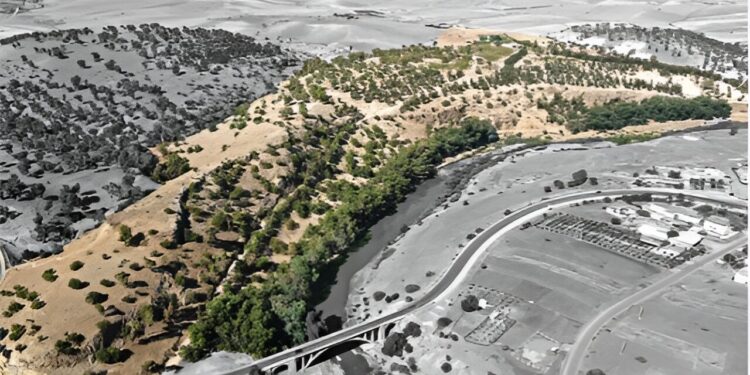Aerial photograph of the Oued Beht ridge and river, highlighted in colour. Credit: Toby Wilkinson
Archaeological work in Morocco has uncovered the oldest previously unknown agricultural society, dating from a little-known period of prehistory in northwest Africa.
This study, published today in Antiquityreveals for the first time the importance of the Maghreb (North-West Africa) in the emergence of complex societies in the Mediterranean basin.
With a Mediterranean environment, a border with the Sahara Desert and the shortest sea crossing between Africa and Europe, the Maghreb is perfectly situated as a hub for major cultural developments and intercontinental connections in the past.
Although the importance of the region during the Paleolithic, Iron Age and Islamic periods is well known, there is a significant gap in knowledge of the archaeology of the Maghreb between circa 4000 and 1000 BC, a period of dynamic change across much of the Mediterranean.
To achieve this, Youssef Bokbot (INSAP), Cyprian Broodbank (University of Cambridge) and Giulio Lucarini (CNR-ISPC and ISMEO) carried out collaborative and multidisciplinary archaeological fieldwork in Oued Beht, Morocco.
Professor Broodbank says: “For over thirty years I have been convinced that Mediterranean archaeology has missed something fundamental in the late prehistoric period of North Africa. Today we finally know that this was true and we can begin to think in new ways, recognising the dynamic contribution of Africans to the emergence and interactions of early Mediterranean societies.”
As the authors point out, “for more than a century, the last great unknown of late Mediterranean prehistory has been the role played by the societies of the South African coasts of the Mediterranean, west of Egypt. Our discoveries prove that this gap is not due to a lack of major prehistoric activity, but to a relative lack of research and publications. Oued Beht now affirms the central role of the Maghreb in the emergence of Mediterranean and African societies in the broad sense.”
These results reveal that the site was the largest agricultural complex of this period in Africa outside the Nile region. All the evidence points to the presence of a large-scale agricultural settlement, similar in size to that of Troy in the Early Bronze Age.
The team recovered plant and animal remains, pottery and lithic objects of unprecedented value, all dating to the Late Neolithic period. The excavations also revealed extensive evidence of deep storage pits.
It is important to note that contemporary sites with similar pits have been discovered across the Strait of Gibraltar in Iberia, where finds of ivory and ostrich eggs have long pointed to links with Africa. This suggests that the Maghreb played a key role in the development of the western Mediterranean during the fourth millennium BC.
Oued Beht and the northwestern Maghreb were clearly an integral part of the Mediterranean region. These discoveries therefore considerably change our understanding of the late prehistory of the Mediterranean and Africa.
As the authors of the Antiquity The article states: “It is crucial to view Oued Beht within a broader framework of co-evolution and connectivity encompassing peoples on both sides of the Mediterranean-Atlantic gateway during the late fourth and third millennia BCE – and, despite the likelihood of movement in both directions, to recognize it as a specifically African community that contributed substantially to the formation of this social world.”
More information:
Antiquity (2024). DOI: 10.15184/aqy.2024.101
Provided by the University of Cambridge
Quote:A previously unknown Neolithic society in Morocco discovered: the role of North Africa in Mediterranean prehistory (2024, September 23) retrieved September 23, 2024 from
This document is subject to copyright. Apart from any fair dealing for the purpose of private study or research, no part may be reproduced without written permission. The content is provided for informational purposes only.



